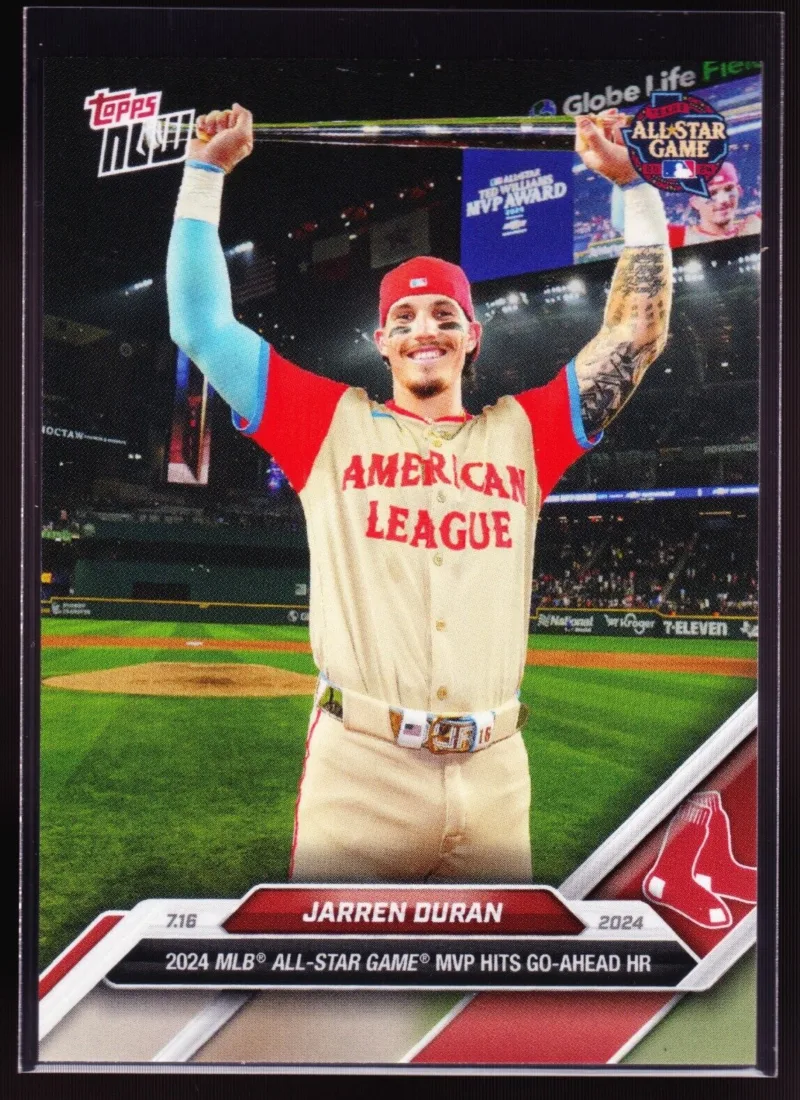
A Look Back at Midsummer Stars
Long before the Home Run Derby took center stage, players like Brooks Robinson and Reggie Jackson were building their All-Star Game legacies the old-fashioned way — with clutch hits and unforgettable power.
Let’s review some of the standout All-Star MVP award winners and their best cards.
All-Star Back in the Day
In the 1966 All-Star Game, the National League would win the game, but Brooks Robinson went 3-for-4 with a triple and scored a run — enough to earn him MVP honors. While Topps didn’t produce an MVP-specific card at the time, his 1957 Topps rookie card (#328) remains a Hobby favorite, showing the poised young third baseman before he became a 16-time Gold Glover.
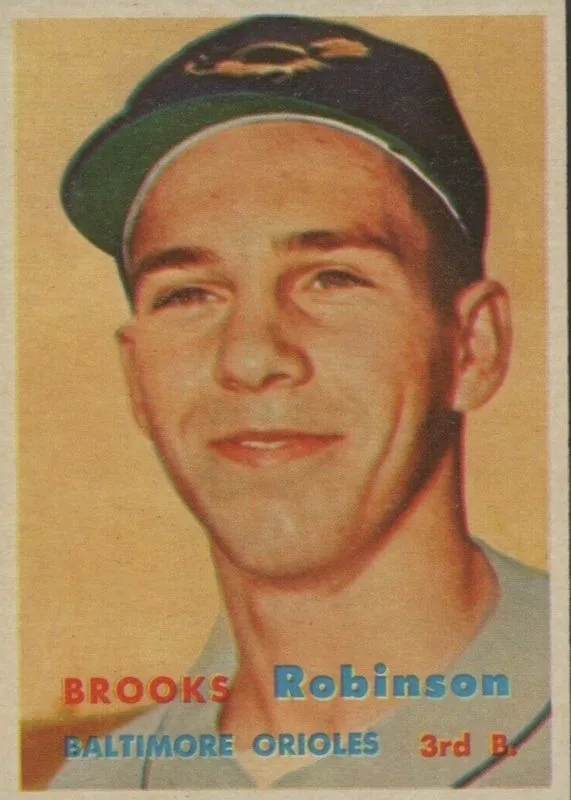
The 1971 All-Star Game at Detroit’s Tiger Stadium was a showcase of baseball’s elite, featuring 26 future Hall of Famers. While Reggie Jackson’s prodigious home run off Dock Ellis, which struck a light tower and was estimated at over 500 feet, remains a highlight reel staple, it was Frank Robinson who earned the MVP award that year.
Robinson’s two-run homer in the third inning gave the American League a lead they wouldn’t relinquish, marking him as the first player to hit home runs for both leagues in All-Star Game history. Collectors can commemorate this achievement with Robinson’s 1971 Topps #640 card, which captures the Orioles slugger during his MVP season. Notably, Reggie Jackson would win the All-Star MVP award in 1973.
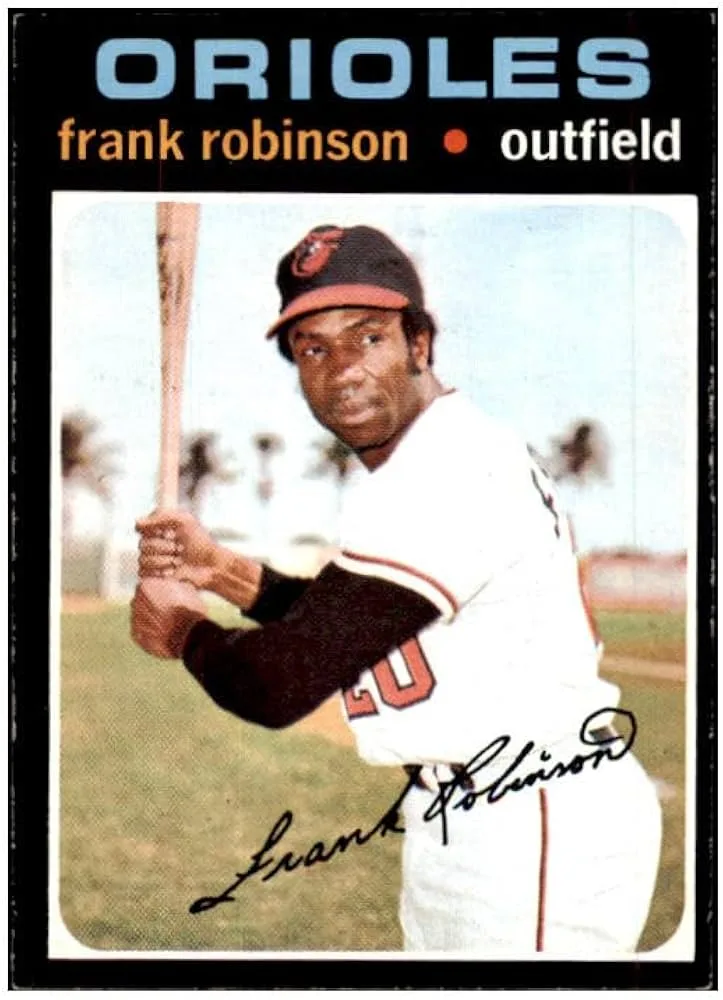
Evolution of the Game
As the game evolved, so did the MVP moments. In 1981, Gary Carter homered twice in a tight NL win, earning MVP honors — then won the award again in 1984. Five players have won the All-Star MVP award twice: Willie Mays, Steve Garvey, Carter, Cal Ripken Jr., and Mike Trout. Gary Carter’s 1975 Topps rookie card (#620), featuring a vibrant four-player design, is one of the more iconic rookie cards of the era.
The Hobby had evolved by the late ’90s, and there you get Roberto Alomar — whose performance in the 1998 All-Star Game (3-for-4, HR, SB) electrified fans. The following year, Topps Tek issued a visually striking card honoring Alomar’s MVP achievement, blending acetate layering and bold design to reflect the flair of his play.
And who could forget Bo Jackson in 1989? Leading off with a towering home run, stealing a base, and taking home MVP honors — all while captivating fans with his otherworldly athleticism. His 1987 Topps “Future Stars” card (#170) is more than a fun retro card — it’s a tribute to a time when Bo seemed unstoppable.
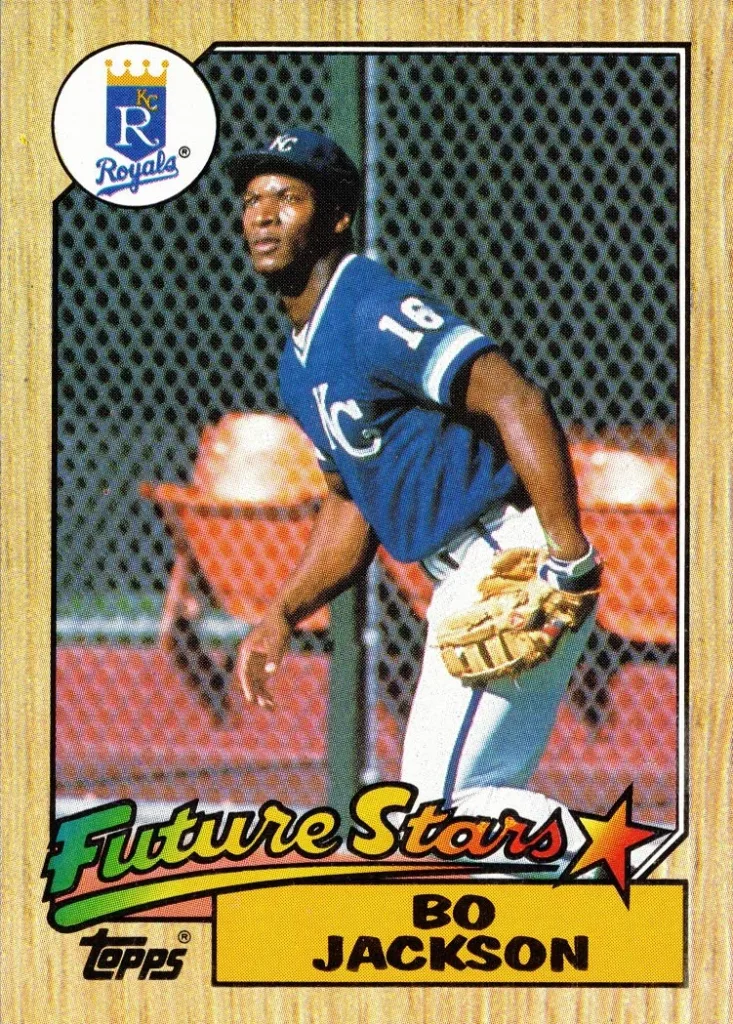
Modern Greats, New Designs, and Real-Time Collecting
As the All-Star Game transitioned into the 21st century, the performances became more polished, and the cards more sophisticated. One of the most memorable modern MVP moments came in 2000, when Derek Jeter went 3-for-3 and became the first Yankee to win the award. His 1993 Topps rookie card (#98) — understated, clean, and classic — remains a cornerstone of ’90s collecting.
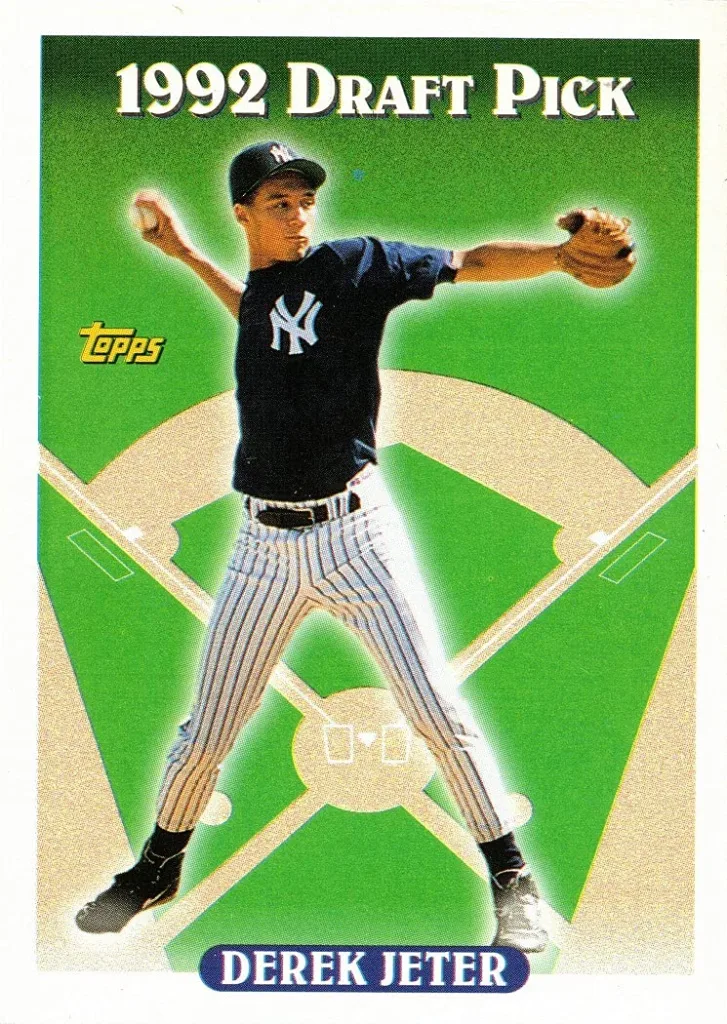
Cal Ripken Jr., a two-time All-Star MVP (1991, 2001), provided the emotional highlight of the 2001 game, homering in his final Midsummer Classic. By that time, his 1982 Topps Traded rookie card (#98T) had already become a treasure, but that farewell blast added another layer of meaning.
Then came Mike Trout, who achieved something no one else has: back-to-back MVPs in 2014 and 2015. With his trademark consistency, Trout delivered extra-base hits, smart base running, and defense — defining an era. His 2011 Topps Update rookie card (#US175) is the face of modern collecting and spiked in value after those performances.
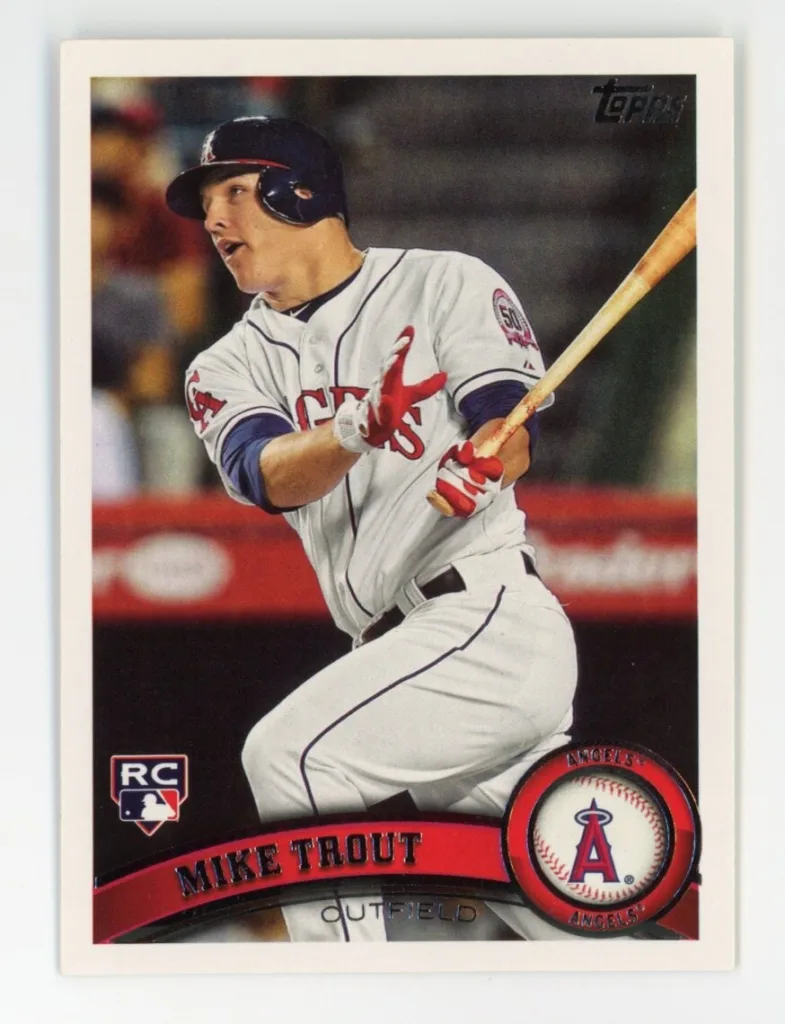
Even those who didn’t win MVP sometimes felt like they did. In 2021, Shohei Ohtani didn’t take home the award, but he made history as the first player to start as both pitcher and leadoff hitter. His two-way brilliance — a scoreless inning and reaching base twice — made him the undisputed star of the night. His 2018 Topps Chrome rookie card (#150) soared in popularity as fans scrambled to capture the moment.
That same year, Vladimir Guerrero Jr. earned MVP honors with a 468-foot home run, becoming the youngest player ever to win the award. His 2019 Topps “No Number” factory set variation — featuring his sweet follow-through and vintage design flavor — quickly became a fan favorite.
Topps has also found creative ways to keep pace with these MVP moments in real time. The Topps NOW series has captured MVP highlights shortly after they happen, preserving baseball history while it’s still fresh. In 2022, Giancarlo Stanton earned MVP honors with a game-tying blast in front of his home crowd at Dodger Stadium — a moment Topps NOW turned into a card within hours. And in 2024, Jarren Duran surprised fans with his combination of clutch hitting and speed, earning MVP honors — and his own Topps NOW card to match.
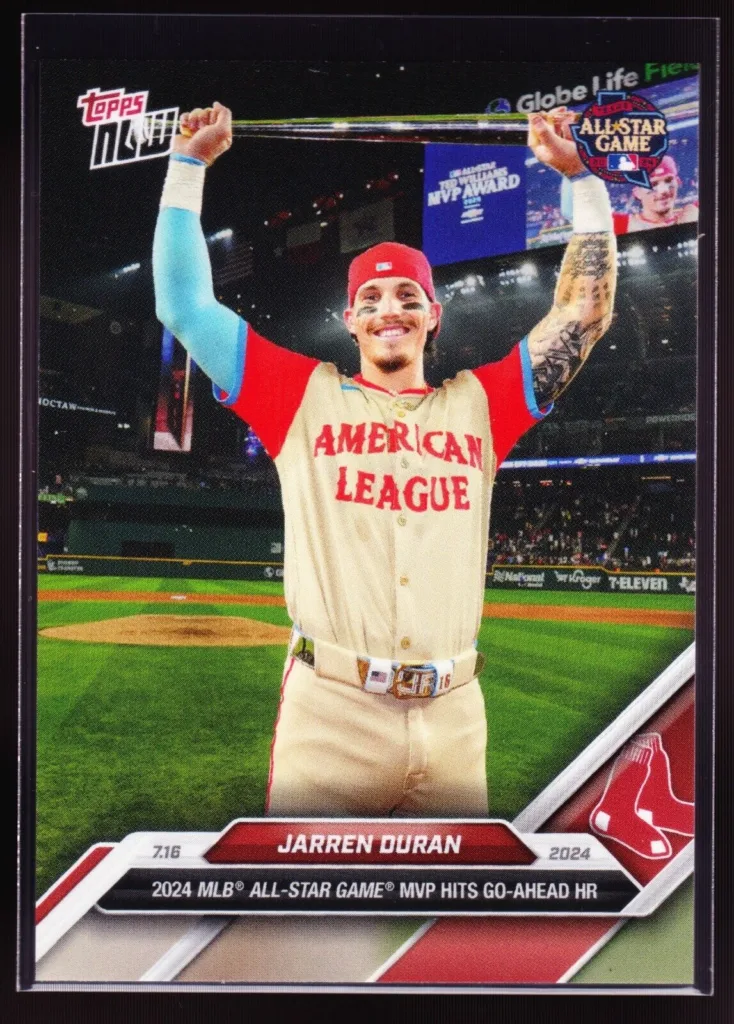
The 2017 All-Star MVP Insert Set: Celebrating Greatness
One of the most collector-friendly nods to All-Star greatness came in 2017, when Topps released a special insert series honoring past All-Star Game MVPs. The checklist included Hall of Famers and modern stars alike — from Mike Trout and Cal Ripken Jr. to Willie McCovey and Carl Crawford. With sharp graphics and player-focused write-ups, the 2017 set offered fans a mini-history of the game’s brightest midsummer stars, all in one elegant package.
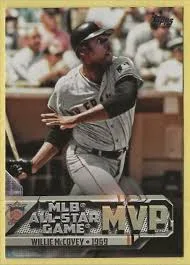
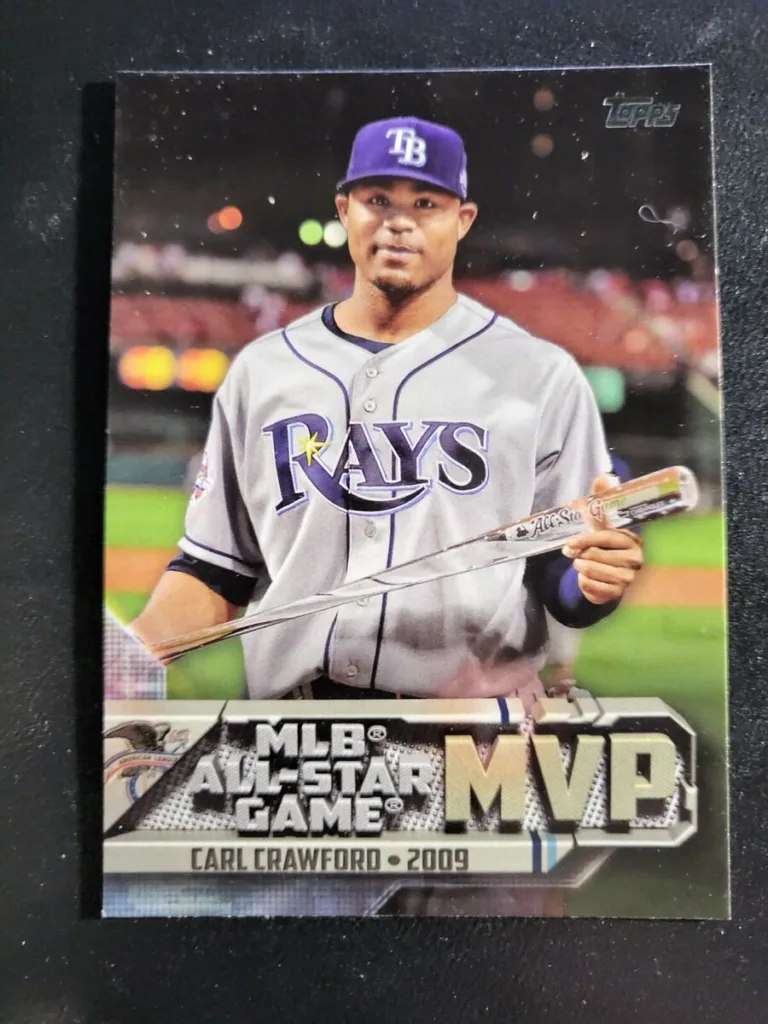
The Lasting Legacies of All-Star MVPs
The All-Star Game may be an exhibition, but its MVPs have created some of the most lasting memories in baseball, and Topps has been there to capture those moments year after year. This season, fans begin voting for All-Stars on June 5, and the game at Atlanta’s Truist Park will take place on July 15.
Whether it’s Bo Jackson’s blast, Mike Trout’s back-to-back dominance, or a surprise hero like Jarren Duran, these performances come to life again each time a collector flips through their cards. From vintage rookies to modern inserts, from Tek acetate to Topps NOW immediacy, the MVP legacy lives on — one card at a time.
More Topps Office Hours
- Office Hours | Topps NOW®— Capturing Baseball’s Viral Moments in Real Time
- Office Hours | 2025 MLB Breakout Stars and Cards: Pre-All-Star Edition
- Office Hours | Baseball’s Greatest Names